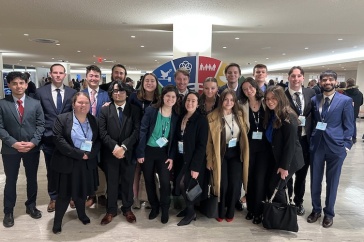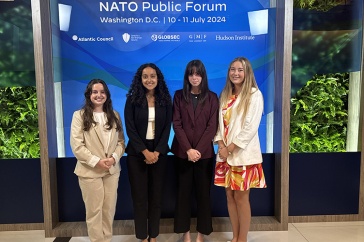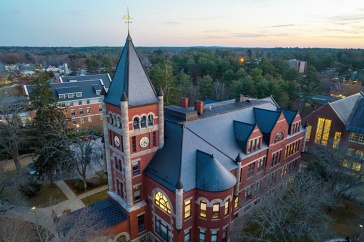
Jeannie Sowers, associate professor of political science, has been awarded a two-year grant from the Gerda Henkel Stiftung Foundation for her project, “Targeting Environmental Infrastructures: Water, Energy, and Civilians in the New Middle Eastern Wars,” with Prof. Erika Weinthal at Duke University. The foundation promotes the study of science, humanities and "issues of great relevance to contemporary life and the future.” This project is funded as part of the foundation’s program on “Security, Society and the State.”
The project analyzes how water, energy and sanitation infrastructures are targeted in ongoing warfare in the Middle East and North Africa. Such activities have a devastating impact on civilians and implications for how a society sustains and rebuilds itself; yet, the practice has not been systematically studied, says Sowers.
Sowers and Weinthal will seek to understand the tactics of this type of warfare, why infrastructure targeting is carried out and who the perpetrators are. They will also examine how international law attempts to address these practices, how international humanitarian organizations are responding to changes in warfare, and how repeated destruction of infrastructure impacts a nation’s ability to function and rebuild. The project also includes Prof. Neda Zawahri at Cleveland State University.
“We aim to create an adequate baseline of empirical documentation and use this to generate theoretical propositions about the goals, tactics and consequences of targeting basic infrastructure,” says Sowers.
The grant will support work with graduate students to expand a preliminary database created by Sowers and Weinthal and to conduct fieldwork with humanitarian organizations working to cope with the destruction of basic infrastructure. The database currently tracks infrastructure targeting associated with water, energy, health facilities and sanitation across the conflict zones of Syria, Iraq, Libya and Yemen, and is being expanded to include long-term destruction of basic civilian infrastructure in Iraq, Palestine, Lebanon and Egypt's Sinai.
“We recognize that war makes it difficult to document the full scope of direct, conflict-related damage of environmental infrastructure,” write Sowers and Weinthal in their proposal. “Yet increasingly, coverage via social media, civil society actors and NGOs provide first hand accounting of attacks on environmental infrastructure, which can be triangulated with satellite imagery, UN damage assessments and other formalized reporting systems.”
Sowers also has received a UNH Faculty Scholars Grant for this project, which will support her plans to co-author a series of articles or a book manuscript with Weinthal and Zawahri detailing the results of their research.
A newly-formed interdisciplinary scholars team will also assist, supported by the COLA Murkland Interdisciplinary Scholarly Teams (MIST) initiative. In addition to Sowers and Weinthal, the team includes Michael Palace at UNH’s Institute for the Study of Earth, Oceans and Space (EOS), who will help with geospatial analysis, mapping and visualizations. With funding from the Provost’s Office through the CoRe Initiative to support interdisciplinary working groups, a broader team including Cameron Wake from EOS and Catherine Ashcraft from Natural Resources and the Environment will work developing grant proposals and projects at the intersection of geospatial, environmental and social sciences. The team will also convene a broader series of lectures open to the UNH community on applying geospatial techniques to questions of development and conflict.
-
Written By:
Susan Dumais '88 '02G | College of Liberal Arts
















































